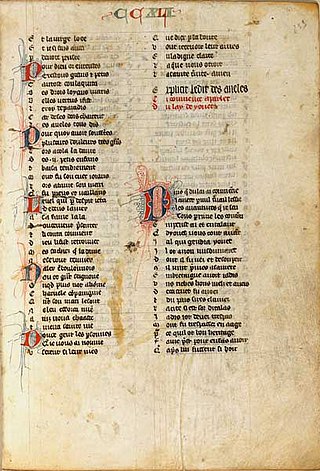Related Research Articles
"Lady Isabel and the Elf Knight" is the English common name representative of a very large class of European ballads.
Willie's Lady is Child ballad number 6 and Roud #220. The earliest known copy of the ballad is from a recitation transcribed in 1783.
"The Cruel Mother" is a murder ballad originating in England that has since become popular throughout the wider English-speaking world.
"The Wee Wee Man" is an Anglo-Scottish border ballad, existing in several variants.

"Kemp Owyne" or "Kempion" is a traditional English-language folk ballad.

"Hind Horn" is a traditional English and Scottish folk ballad.
"Prince Robert", also known as "Lord Abore and Mary Flynn" or "Harry Saunders", is a traditional English-language murder ballad, likely originating in Scotland.
The Laird o Drum is an English-language folk song, originating in Scotland. Francis James Child collected six versions, labeled A to F, all based on Alexander Irvine's courtship of and marriage to Margaret Coutts, his second wife. Though the events depicted in the ballad took place in the late 1600s, the earliest version of the ballad dates back to the early 1800s.
"Gil Brenton" is an English-language folk song, existing in several variants.
"The Marriage of Sir Gawain" is an English Arthurian ballad, collected as Child Ballad 31. Found in the Percy Folio, it is a fragmented account of the story of Sir Gawain and the loathly lady, which has been preserved in fuller form in the medieval poem The Wedding of Sir Gawain and Dame Ragnelle. The loathly lady episode itself dates at least back to Geoffrey Chaucer's "Wife of Bath's Tale" from The Canterbury Tales. Unlike most of the Child Ballads, but like the Arthurian "King Arthur and King Cornwall" and "The Boy and the Mantle", "The Marriage of Sir Gawain" is not a folk ballad but a song for professional minstrels.
Crow and Pie is an English-language folk song. It is one of the oldest preserved ballads, dating to c. 1500. Pie is the now-obsolete original name for the magpie, a bird often connected with sorrow and misfortune. The crow is a scavenger, often thought of as feeding upon the bodies of men hanged or slain in battle, and thus associated with unhallowed and violent death.
Sweet William's Ghost is an English ballad and folk song which exists in many lyrical variations and musical arrangements. Early known printings of the song include Allan Ramsay's The Tea-Table Miscellany in 1740 and Thomas Percy's Reliques of Ancient English Poetry in 1765. Percy believed that the last two stanzas of the version he published were later additions, but that the details of the story they recounted were original.
"Proud Lady Margaret" is an English-language folk song.
"The King's Dochter Lady Jean", also called "The King's Daughter," "Fair Rosie Ann," or "Queen Jane", is an English-language folk song.
"Lady Isabel" is an English ballad known as Child Ballad 261 and Roud #3884.
Will Stewart and John is an English-language folk song, catalogued as Roud 3973 and Child 107.

"Yonec" is one of the Lais of Marie de France, written in the twelfth century by the French poet known only as Marie de France. Yonec is a Breton lai, a type of narrative poem. The poem is written in the Anglo-Norman dialect of Old French in rhyming couplets of eight syllables each. This lai tells the story of a woman who seeks to escape a loveless marriage, and of the child born from the love that she found elsewhere.
The Twa Knights is a traditional Scottish ballad. It was collected by Francis James Child as Child ballad number 268. It is highly possible that the ballad was popularly unknown in Scotland, and only known through print. It has since been given the Roud number of 303.
Earl Rothes is an English-language folk song. Child offers no comment on the ballad beyond its basic story, listing it among the final ballads in a five-volume work that covered 305 of the form.
Thomas o Yonderdale is an English-language folk song, catalogued as Child ballad number 253 and Roud number 3890. Child assessed that this "apocryphal" ballad seemed like a recent fabrication from a pastiche of other ballads.
References
- ↑ Francis James Child, The English and Scottish Popular Ballads, v 2, p 317, Dover Publications, New York 1965